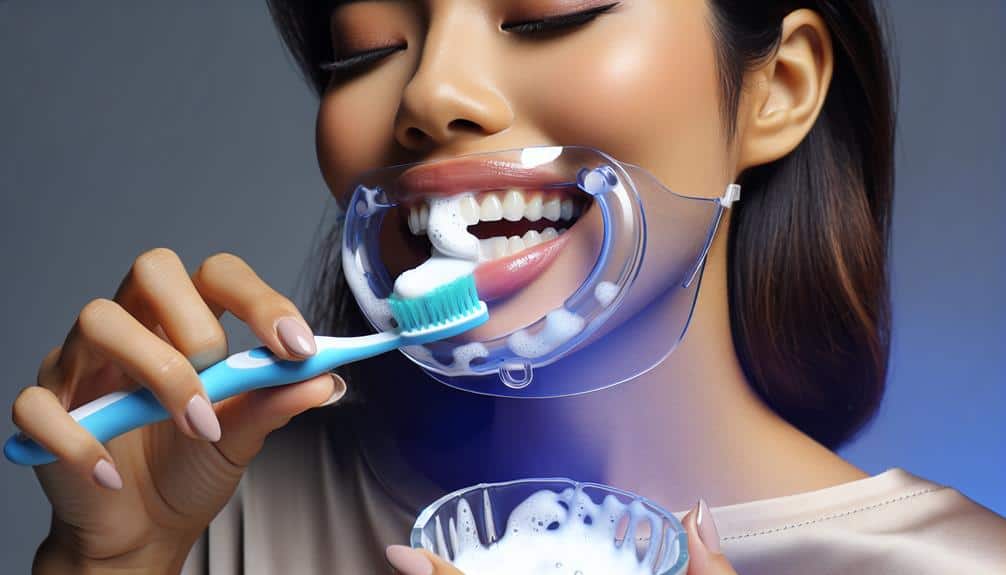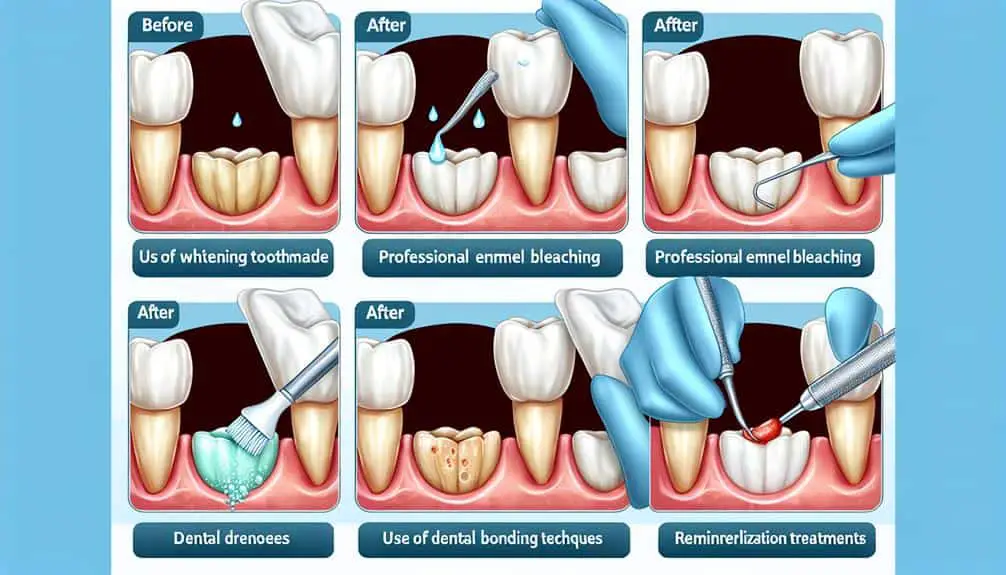To securely whiten your teeth without causing harm, focus on enamel health by selecting mild products that effectively remove stains. Opt for natural remedies like baking soda or ADA-approved products with safe ingredients. Use whitening agents carefully, following usage instructions to minimize risks. Establish consistent oral care habits, including daily brushing with fluoride toothpaste and regular flossing. Seeking professional advice guarantees tailored and safe whitening treatments for best results. Discover more tips for achieving a bright smile while protecting your enamel.
Key Points
- Choose gentle whitening products to protect enamel.
- Prioritize safe ingredients for effective stain removal.
- Use natural remedies like baking soda cautiously.
- Follow usage guidelines to prevent enamel damage.
- Consider professional consultation for personalized advice.
Importance of Enamel Health
To maintain the health of your enamel, it's important to understand its significance in protecting your teeth from damage and sensitivity. Enamel is the outermost layer of your teeth and acts as a shield against decay and temperature sensitivity.
Preventive measures play a vital role in enamel protection. Brushing your teeth twice a day with fluoride toothpaste helps to strengthen enamel by remineralization. Flossing daily removes plaque and food particles that can erode enamel over time. Regular dental check-ups allow your dentist to detect any early signs of enamel erosion or damage, providing an opportunity for timely intervention.
In addition to oral hygiene practices, dietary choices can impact enamel health. Acidic foods and beverages can weaken enamel, so limiting their consumption can help protect your teeth. Drinking plenty of water can help wash away acids and sugars that can harm enamel. Avoiding habits like teeth grinding can also safeguard your enamel from unnecessary wear and tear.
Choosing Safe Whitening Products
Maintaining the health of your enamel is paramount when considering safe whitening products for your teeth. When choosing safe whitening products, it's crucial to look for options that are gentle on your enamel while effectively removing stains.
Natural remedies like baking soda and hydrogen peroxide can be used cautiously for teeth whitening. These ingredients have mild abrasive properties that can help remove surface stains but shouldn't be used excessively to prevent enamel damage. DIY techniques such as oil pulling with coconut oil or using activated charcoal are popular options, but their effectiveness and safety for enamel should be evaluated carefully before use.
When selecting commercial whitening products, opt for those that are ADA-approved and contain ingredients like carbamide peroxide or hydrogen peroxide within safe concentrations. Always follow the instructions provided to minimize the risk of enamel damage and achieve a brighter smile safely.
Gentle Whitening Techniques
For crucial whitening techniques that prioritize enamel health, consider incorporating natural remedies or ADA-approved products with safe whitening agents. Natural remedies like baking soda mixed with water to form a paste can help gently remove surface stains without causing harm to the enamel. Another natural option is using activated charcoal in moderation, as it can absorb stains and toxins from the teeth. When opting for commercial products, choose those with the ADA Seal of Acceptance, ensuring they're safe and effective.
To avoid sensitivity during whitening, it's crucial to follow the recommended usage guidelines. Overusing whitening products or leaving them on for longer than instructed can lead to increased sensitivity. Consider using desensitizing toothpaste or applying fluoride gel after whitening to help strengthen enamel and reduce sensitivity. Additionally, spacing out whitening treatments and giving your teeth breaks between sessions can also help prevent sensitivity. By incorporating these crucial whitening techniques and being mindful of sensitivity, you can achieve a brighter smile without compromising your enamel health.
Consistent Oral Care Habits
Consistent oral care habits play an essential role in maintaining a healthy and bright smile. To keep your teeth in top condition, it's vital to adhere to a regular brushing and flossing routine. Here are three key points to keep in mind:
- Regular Brushing: Brushing your teeth at least twice a day with fluoride toothpaste helps remove plaque, bacteria, and food particles that can lead to tooth decay and discoloration. Make sure to use gentle circular motions and brush all surfaces of your teeth for a thorough clean.
- Flossing Routine: Flossing daily is just as crucial as brushing, as it helps remove plaque and debris from between the teeth and along the gum line. This helps prevent cavities and gum disease while contributing to a whiter smile.
- Consistent Dental Check-ups: Regular visits to your dentist for professional cleanings and check-ups can help detect any potential issues early on and make sure your oral care routine is effective. Dental professionals can provide personalized advice to improve your oral health and maintain a bright smile.
Professional Consultation Benefits
Regular dental check-ups with a professional are crucial for optimizing oral health and achieving a vibrant smile. The benefits of seeking expert advice for teeth whitening include personalized recommendations based on your specific oral health needs.
A dental professional can evaluate your current oral health status, identify any underlying issues that may affect the whitening process, and recommend the most suitable whitening treatment for you. Additionally, professional consultations guarantee that the whitening products used are safe, effective, and tailored to your individual requirements, minimizing the risk of potential damage to your teeth and gums.
Frequently Asked Questions
Can Whitening Toothpaste Damage Enamel if Used Too Frequently?
Brushing too frequently with whitening toothpaste may harm enamel due to abrasive properties. To protect enamel, limit usage to twice daily. Consult your dentist for personalized advice. Proper frequency and choice of toothpaste are crucial for enamel health.
Are Natural Remedies Like Lemon Juice Effective for Whitening Teeth?
Using lemon juice as a natural remedy for whitening teeth may seem effective, but be cautious. Lemon juice's acidity can erode enamel, leading to sensitivity and damage. Consider safer alternatives like professional whitening treatments for a brighter smile.
How Long Does It Take to See Results From At-Home Whitening Products?
When using at-home whitening products, results typically start showing within a week. Consistency is key for success. Follow best practices like not overusing the products to avoid damaging your teeth. Average duration for noticeable results is around 1-2 weeks.
Are There Any Foods or Drinks to Avoid After Whitening to Prevent Staining?
After whitening your teeth, focus on a post-whitening diet to prevent stains. Avoid foods and drinks like coffee, red wine, berries, and dark sauces. Opt for lighter options and remember to brush your teeth after consuming stain-causing items.
Can Over-The-Counter Whitening Products Cause Sensitivity in Teeth?
Sure thing! Over-the-counter whitening products may indeed cause sensitivity in your teeth. To prevent this, consider using toothpaste designed for sensitivity prevention and make sure you're not overusing the whitening products to protect your tooth enamel.



